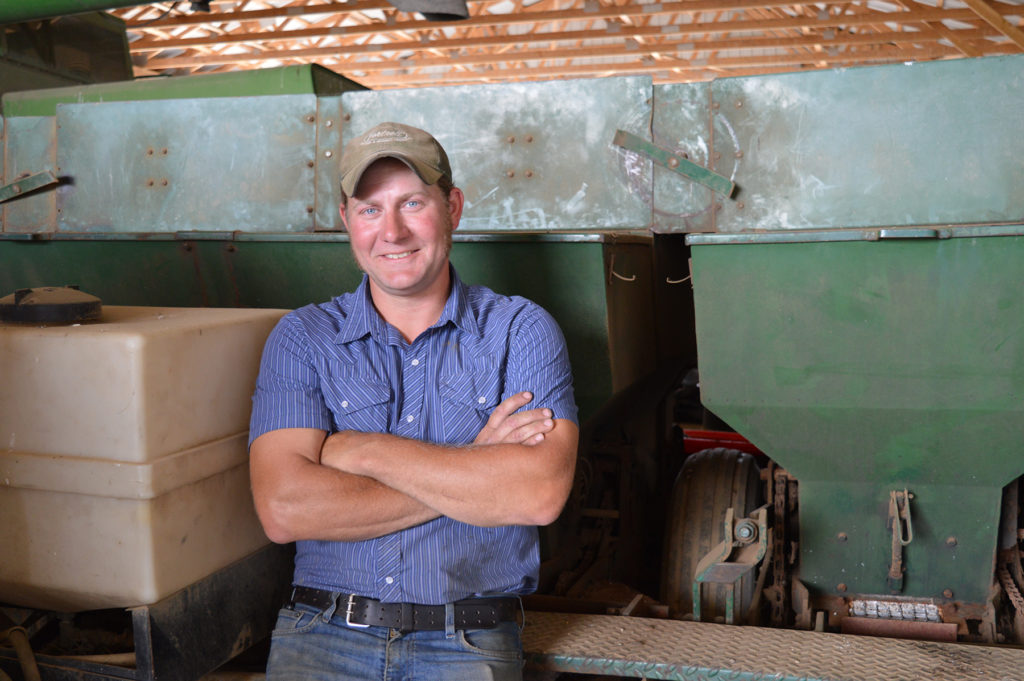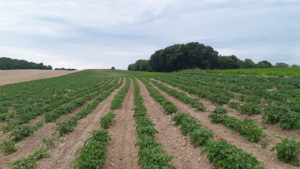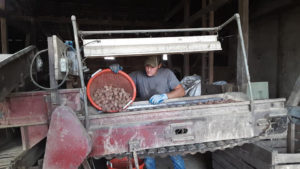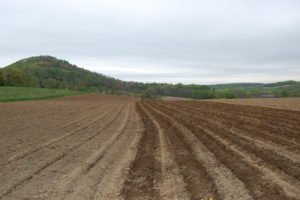
Answering the call
OriGin Farm is primarily a certified organic dairy business, but the operation has answered the call to supply organic potatoes by meeting the challenge head on.
Orin Moyer has owned the 400- acre Lenhartsville, Pennsylvania-based location with his wife, Ginger, for about 14 years. At the 2022 Mid-Atlantic Fruit & Vegetable Convention in Hershey, Moyer shared his experiences regarding the organic portion of the business for the past seven years.
“Growing organic potatoes is fun and exciting,” Moyer said. “It will be both a challenge and a reward.”
Sterman Masser Potato Farms in Berks County, with whom OriGin does business, “were pushing to get locally grown organic potatoes. We had been growing them organically for about seven years.”
A first step for OriGin was to delve into seed selection and curing.

“We found that for organic marketing, we don’t have a lot of market for white potatoes,” Moyer said. “Typically, we have better luck with yellow-flesh potatoes, red-skins or off varieties. We don’t do a lot with plain whites.” He listed Lehigh, Dark Red Norland, Kennebec, Adirondack Blue, Blackberry, russets and Satina as varieties he has tried.
When selecting varieties, growers should talk to whom the product is being sold, and make sure there is an active market for that selection. “If you don’t, especially in an organic setting, you could end up with a whole lot of potatoes and you’re without a buyer,” he said.
“The varieties we have grown, most of them have been good for us. Lehigh is definitely a variety that we like to grow. They are yellow-fleshed skin and market well for us, typically.
“For dark reds, we have had some issues with skin coloring. One issue we’ve had, I’m not sure if it was soil-related, or other issues, we have had issues with washing on our reds, being the color looks washed out. That makes them pretty much non-marketable, particularly in an organic setting. If we grow reds, we do try to dig them earlier to save the color.
“We had a real bad experience with Satina one time,” Moyer said. “We are non-irrigated and got pretty dry. Satina can tend to heat sprout, if you get a dry spell, followed by a big rush of water. In conventional settings they spray (Royal MH-30SG to reduce the number of volunteer potatoes the following spring because of its ability to control sprouting) on them.”
SEED SELECTION
It’s important to purchase high-quality organic seed, possibly through brokers or co-ops, Moyer said. “Obviously the bigger you’re packaging, you’re going to get a better price. There is a lot of huge pricing variation out there on organic seed. When we first got into it, we were looking to pay anywhere from 80 to 90 cents; now we can get organic seed down to 42, 43 cents.
OriGin keeps its seed dry, using a straight fir bar dust as a seed treatment.
“Getting straight fir bark without fungicides is quite a hassle. Two years ago, we bought quite a bit of straight fir bark from Wisconsin. It’s a really fine, dry dust powder that helps heal that cut-seed surface. We got a lot better germination and seed vitality by using it, and it’s really pretty cheap. So that’s something I would definitely suggest.”
He said some growers do not to cut organic seed “because they feel it produces that whole issue of cuts, seed rock, etc. There are some guys who are trying to source smaller seed, and then they don’t cut it. The downside to that is it increases your seed cost quite a bit. We cut all of our seed.”

STANDARD TILLING
“We try to not work the ground a whole lot,” said Moyer, who also is on the agronomy team at Fertrell. “For potatoes, just for weed control, it’s been our experience the more you work it, cover mulch it, go over it multiple times, it just makes more of a firm seed bed. We’ll typically roll-bar mow it, go across it one time with a disc and then we plant. We don’t overwork it.”
Dairy manure or poultry litter is typically applied in the fall or during the January-February period. The farm applies 1,000 pounds per acre of organic fertilizer in a row, two feet below the seed. Using too much manure can create scab and growth cracks.
Excess manure applied the year before will create additional scab. Depending on what varieties of potatoes are planted, they might not be as susceptible to scab, “so you might not have as much issue with that, but it’s something to make a note of if you go slathering fields with a lot of manure,” Moyer said.
Moyer takes soil tests to make a custom blend of whatever they need to put in, depending on whether someone is planting table or chip stock. It’s applied with a standard planter, just like everybody else.
“We’ve found it works best if we run potatoes on our farm, to run them in a rotation with corn or wheat,” he said. “We have tried potatoes after sod, and typically we do not get as good of a result. We find we get a lot more wireworm pressure coming in after sod than in a field that was corn. We always have a cover crop in.”

The farm usually plants on spacing of 10 to 11 inches, depending on if it’s growing table or chip stock, which is uncommon.
For planting depth, Moyer sets his hilling discs aggressively on the planter.
“We plan to go through at least two times after planting,” he said. “If we don’t have a pretty good hill there from the start, we actually just end up pulling it out and impact the seed. We do try to hill them pretty good.”
Moyer said “a pretty cheap and easy” cover crop of wheat crimson clover is a typical approach.
MARKETING OUTLETS
Is there a profitable market for organic potatoes?
“There’s lots of places to market potatoes,” Moyer said. There aren’t thousands of potato growers in (Pennsylvania). It’s a pretty small group of people. There are brokers. We’ve never moved any through a broker.”
Moyer discovered some private outlets where he could sell his product.
“We feel we’re doing a little bit better that way. We’re doing all the grating and washing. Packing, we like to send out in 2,000-pound totes. We’ve packed almost everything. Be flexible about your packaging. Whatever your buyer wants, you have to provide.”
OriGin has packed in three and five-pound poly/mesh; five, 10 and 50-pound bags, wooden bin boxes, 2,000-pound totes, cardboard melon boxes and bulk loose.
“Every farm is different. It all depends how much labor you have,” he said. Some guys have lots of labor, some have to buy-in all of it. Figure what your labor’s worth if you’re going to put a lot of extra labor into packing.
“Potatoes are kind of like firewood,” he said. “There’s not a lot of room for a fingerprint on them anymore. They’re just a lot of work. You can handle them mechanically, use conveyors, whatever. There’s still a lot of work in them.
“If you are selling table stock, you’re going to end up with seconds and Bs and other issues. You should find a market for it, or you’re going to have all of this junk you’ve got to store, and you don’t know what to do with.”
Orin Moyer owns OriGin Farm, a Pennsylvania-based dairy and organic potato farm he operates with his wife, Ginger. Photos: OriGin Farm.







